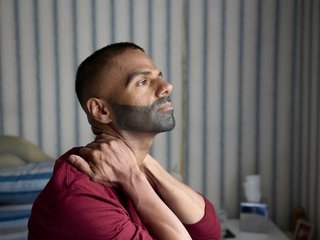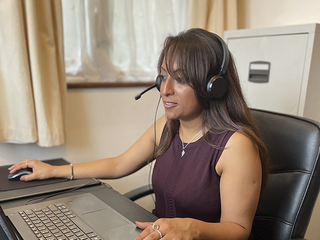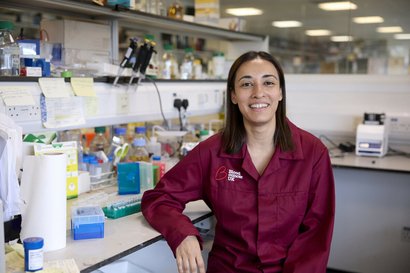CAR T-cell therapy recovery and side effects
Recovering from CAR T-cell therapy can be challenging. Find out what to expect, including potential side effects and tips to help your recovery.
How long will recovery take?
Recovery from CAR T-cell therapy varies for each person. Typically, it can take a few months to recover. You’ll continue to have follow-up visits beyond this to check on your progress.
Some side effects, such as fatigue, can take longer to fully recover from. Your hospital team are there to help during your recovery, so talk to them if you have any questions or worries.
How long will I be in the hospital?
After having CAR T-cell therapy, you’ll need to stay in hospital for a little while. The length of your stay will depend on things like what type of blood cancer you have, which type of CAR T-cell therapy you received, and how far away from hospital you live. If you’re taking part in a clinical trial, the team who are running the trial may also need to monitor you or do extra tests.
Most people end up staying in hospital for between 10 and 28 days. After this period, you’ll usually be able to go home if:
- You have recovered from any side effects that you’ve experienced
- You have someone at home to care for you.
Ask your doctor how long they expect you’ll have to stay in for.
Possible side effects of CAR T-cell therapy
Most side effects of CAR-T therapy happen in the first few days, but some can happen up to eight weeks later. Your hospital team will monitor you closely for any side effects.
Possible side effects include:
- cytokine release syndrome
- neurological problems
- tumour lysis syndrome
- allergic reactions
- low B cell count
- infection risk
- low blood counts (also called reduced bone marrow reserve).
Read more about each of these side effects below.
Cytokine release syndrome
When they enter your body CAR T-cells can trigger other immune cells. Sometimes this can cause a full-body inflammatory response. This is called cytokine release syndrome (CRS).
Symptoms include:
- flu-like symptoms
- high fever
- low blood pressure.
If you have any of these symptoms your hospital will usually give you antibiotics straight away.
In severe cases, CRS can be life-threatening and you may need to have intensive care in hospital.
Neurological problems
CAR T-cells can affect the nervous system and cause neurological problems. You may hear your hospital team call these side effects immune effector-cell associated neurotoxicity syndrome (ICANS), or neurotoxicity.
Symptoms vary, but can include:
- confusion
- shaking (tremors)
- headaches
- problems with speech, movement or writing
- feeling dizzy.
While you’re in hospital, your nurses will check you every day for any signs of neurological problems. If needed, your hospital can treat neurological symptoms with medicines such as steroids.
Neurological problems usually happen within 28 days after your infusion. There’s a small risk they could happen later than this, up to eight weeks after the infusion. For safety reasons, you are not allowed to drive for eight weeks.
Tumour lysis syndrome
CAR T-cells rapidly destroy cancer cells. When lots of cancer cells are destroyed at once, they release chemicals that can affect your kidneys. This is called tumour lysis syndrome. Your hospital team will monitor for this and provide treatment, including fluids and medicine, if needed.
Allergic reactions
Some people may have an allergic reaction to the CAR T-cells. Your nurse will give you medicine to prevent allergic reactions, but let them know immediately if you feel unwell during or after your infusion.
Low B cell count
B cells are part of your immune system and help fight infections. CAR T-cell therapies aim to destroy cancerous B cells, but they may reduce your numbers of healthy B cells too. This can put you at higher risk from infections.
Your hospital team will monitor your B cell count and may give you a type of treatment called intravenous immunoglobulins if needed.
Infection risk
Because your immune system needs time to recover, you’ll be at higher risk of infections after CAR-T therapy.
Watch out for symptoms of infection, including:
- a high temperature (38°C or above)
- shivering
- a cough or chest pain
- feeling breathless
- extreme tiredness (fatigue)
- redness or pain around your central line, or discharge coming from it
- being sick
- tummy pain
- pain when having a wee or smelly wee
- runny poo (diarrhoea) or blood in your poo
- generally feeling unwell.
Infections can get serious quickly, so call your hospital team straight away if you have any signs of an infection. They should give you details of how to contact them urgently while you’re at home.
If you get lots of infections your hospital may give you treatment called immunoglobulin infusions.
You will have anti-viral, anti-fungal, and anti-bacterial medicines to help prevent infections. You might be asked to take these for a few months until your immune system fully recovers.
Read more about infections.
Low blood counts (also called reduced bone marrow reserve)
After CAR T-cell therapy, you may suffer from a low number of blood cells in your blood (also known as a low blood count, or reduced bone marrow reserve). This can be caused by the impact of CAR-T therapy on top of any previous treatment you’ve had. Some people may need transfusions of blood or platelets to increase their blood counts.
If your white blood cell count is low, you’ll be at higher risk of infections. Your doctor may decide to give you drugs that stimulate your bone marrow to grow more white blood cells, which will help your immune system to recover.
If your doctor thinks that the new CAR T-cells may be preventing normal blood cells from being made, they may recommend additional treatment which reduces the inflammatory response caused by the CAR T-cells.

Blood cancer and your infection risk
Read our information about blood cancer and infection, including who is at risk, what to look out for, and what to do if you think you have an infection.
Follow-up appointments
You’ll have follow-up appointments after you leave hospital to check how your recovery is going.
If you’ve had low blood counts, you’ll have regular check-ups in the first few weeks after going home to monitor your results.
Most people will also have a check-up around 30 days after the infusion. During this appointment, you may have a PET scan or bone marrow biopsy to see how the blood cancer is responding to treatment. If you stayed in hospital for the full 28 days after CAR T-cell therapy, you may have had a PET scan or bone marrow biopsy before you left.
After this, you’ll have a series of routine appointments. Typically, these follow-ups happen:
- three months after infusion – before this appointment you’ll a PET scan if you have lymphoma, or a bone marrow biopsy if you have acute lymphoblastic leukaemia (ALL)
- six months after infusion
- one year after infusion, then
- once a year, every year.
This schedule may vary based on your recovery and hospital guidelines. If you’re ever worried or feel unwell in between appointments, don’t hesitate to contact your hospital team. It’s much better to check and deal with any concerns early, than to wait.
How to help yourself during your recovery
Though some parts of recovery may be out of your control, there’s a lot you can do to actively support yourself and stay motivated. Here are some areas to focus on:
You may not feel very hungry or might even feel sick, but eating and drinking well will help your recovery.
- Aim to eat a balanced diet, but it’s also important to eat what you fancy. Your body needs energy, so it’s better to eat something than nothing at all. You can work toward a healthier diet gradually.
- Try small, frequent meals if a full plate feels too much.
- Drink two to three litres of water daily. If plain water is unappealing, try flavoured water or sugar-free squash.
- Check with your hospital team about drinking alcohol, as it might slow recovery or interact with your medicines.
- Ask about seeing a dietitian, who can give you tailored advice.
- Follow food safety measures to avoid infection
Find out more about eating well.
Being active and building your fitness can boost both physical and mental recovery. It might feel difficult at times, especially if you have fatigue, but these tips can help:
- Start small – try a five or ten minute walk or marching on the spot while you brush your teeth.
- Build up gradually – aim to do a little bit more or walk a little bit further each day.
- Include family or friends in your activities for support and company.
- Consider joining a local parkrun. These free 5K events allow you to walk, run, or volunteer.
- Explore different activities – try a mix of cardio, like walking, dancing or cycling, and strength exercises like yoga and Pilates.
- Ask to speak with a physiotherapist for guidance on exercises that work for you.
Fatigue after CAR T-cell therapy can make even small tasks feel exhausting and may impact your daily routine and mental health.
- Listen to your body – take things at your own pace.
- Plan your day around times when you have more energy, and include enjoyable activities, not just chores.
- Don’t be afraid to ask for help – people are usually willing to support you.
- Stick to a sleep routine, and unwind before bed with relaxing activities like reading, avoiding screens, and limiting sugar and caffeine.
Find out more about managing fatigue.
You may feel a mix of emotions before, during, and after CAR T-cell therapy, including excitement, anxiety, confusion, or loneliness. It can feel overwhelming. Whatever emotions you’re going through, sharing your thoughts and feelings can really help. Let your loved ones and hospital team know how you’re feeling so they can support you.
Read more about looking after your mental health and getting support.
Connecting with friends and family is important for your mental wellbeing. You will be vulnerable to infections while you’re recovering from CAR-T therapy, but there are steps you can take to reduce the risk.
- Remind friends and family not to visit if they’re unwell.
- Try to avoid crowded places or use a face mask if you need to be in public spaces.
- Consider video calls if you’re too fatigued for in-person visits or if others are unwell.
Your skin will more sensitive to the sun after CAR T-cell therapy. Wear SPF 30 or higher sunscreen, and protect your head and eyes with a hat and sunglasses.
You might want to take a holiday after CAR-T therapy. Check with your hospital team about their travel recommendations, especially if going abroad. Make sure you have any vaccinations you need, and good travel insurance.

Living well
Practical tips and real stories to help you with everyday life.
Vaccinations
After CAR T-cell therapy, make sure you get your flu and COVID-19 vaccines. The people you live with should get any vaccines they are offered as well, to protect you from getting ill.
You may need to redo vaccinations you had as a child. Your medical team should talk to you about this, but make sure you ask them if they don’t mention it.
Sex after CAR T-cell therapy
It’s fine to have sex whenever you feel ready after CAR-T therapy, but make sure you protect yourself from infection. Your hospital team can let you know the best way to protect yourself, and advise on contraception.
Recovery from CAR-T therapy can affect your sex life. You might have a low sex drive, feel too tired or worry about changes to your body. These are all normal concerns, but it might feel hard to talk about.
The Anthony Nolan website has information about sex and relationships that can help.
Returning to work or school
When you’re well enough, you can return to work, school, or college. This timing will depend on your recovery and individual circumstances. You might be able to go back sooner if you can work from home or part-time or have a job with limited in-person interactions.
Generally, six months is recommended before going back to work, but your hospital team can guide you. They can also talk to your employer, if needed.

Worried about anything or have questions?
If you need someone to talk to, please don't hesitate to contact our Support Service by phone or email.
About this information
This information was developed in partnership with Anthony Nolan and has been accredited with the PIF TICK, the UK's only quality mark for trusted health information.
Thank you also to Professor Karl Peggs for helping to fact check the information on this page. Professor Peggs is Director of the University College London Hospitals (UCLH) National Institute for Health Research (NIHR) Biomedical Research Centre (BRC), the Director of Research at UCLH and Medical and Scientific Director of the Sir Naim Dangoor Centre for Cellular Immunotherapy at UCLH.
Last full review 2024. Next full review due 2027. We make factual updates to the information throughout this period.
Funding disclosure
The following organisations have funded this information but have had no input into the content or direction of the project: Autolus Therapeutics (a pharmaceutical company) and Beefy’s Charity Foundation.

Our research
Our £500 million investment in research since 1960 has helped transform treatments and taken us to the point where beating blood cancer is now in sight. Our researchers are working to finish the job.
More About ThisWe used generative AI to help us edit this page about CAR T-cell therapy to make it easier to find online. All our information is written by a human and checked by relevant clinical experts before publication.
Find out more about how we create our health information, including our approach to using AI.
